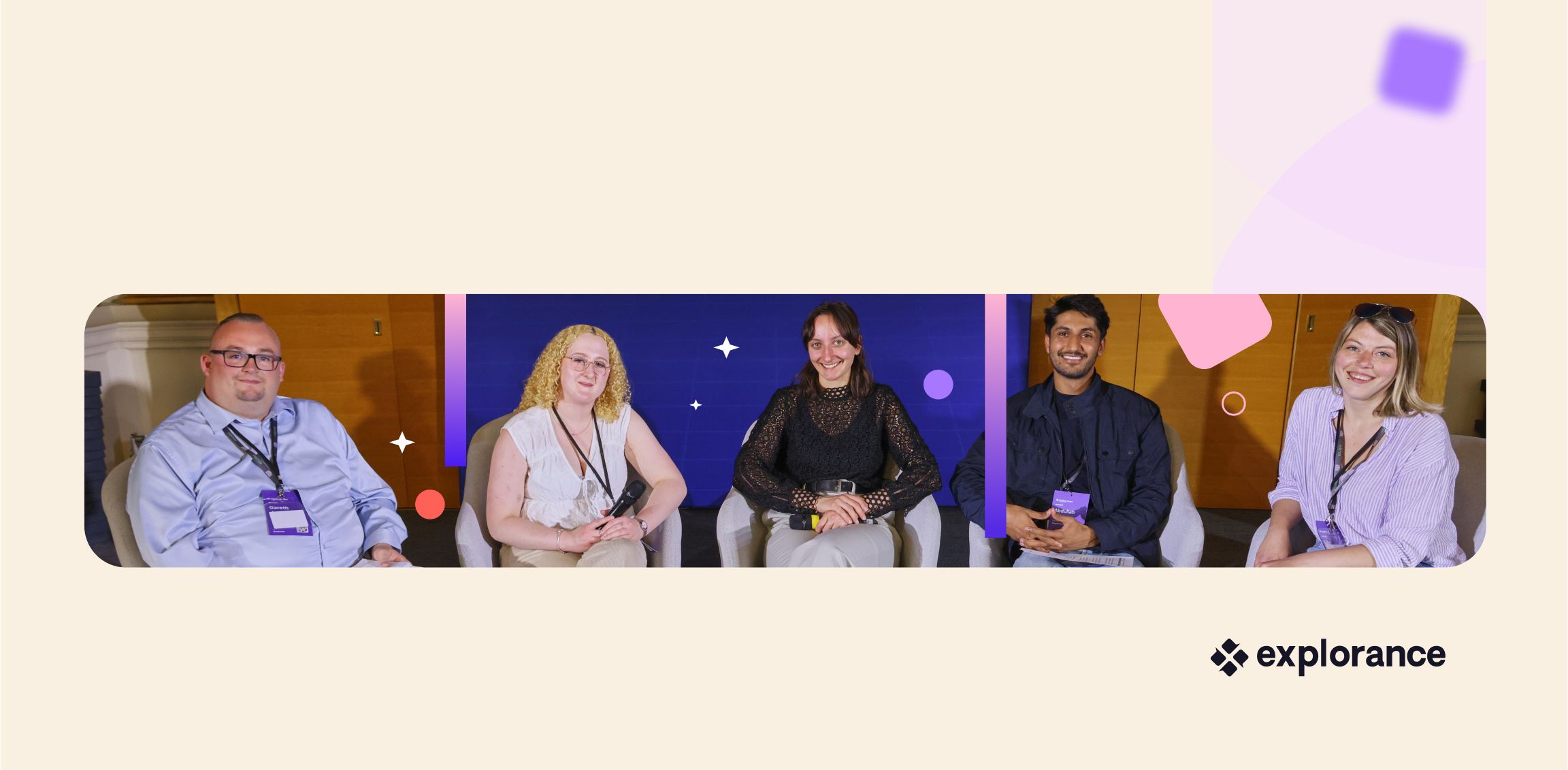5 Key Takeaways From Student Voices in Higher Education 2025

The Student Voices in Higher Education conference, hosted by Explorance, returned for a third year on April 30 and May 1.
Hosted in London, during which a new record was set for the hottest start to any May on record in the UK (!), this year’s event was themed Building a Collaborative Future through Insight and Action, and was attended by over 100 delegates with responsibility for strategic planning, teaching and learning, quality assurance and enhancement, student engagement, and student voice.
Over two days, contributors and attendees came together to explore how student voice can lead to more effective solutions that enhance teaching and learning effectiveness and the student experience. Head over to the Explorance blog for more on the takeaways from Student Voices 2024.
Here’s what we discovered from the shared stories, experiences, best practices, and lessons learned:
1. AI Opportunities Within a Rapidly Evolving Higher Education Landscape
Phil Baty, Chief Global Affairs Officer at Times Higher Education delivered a thought-provoking keynote titled Voices of Dissent: The Future of UK Higher Education and Student Engagement.
As part of this, Phil spoke about harnessing AI to meet and exceed student expectations in an era of intelligent learning, the “opportunity to reboot and give student voice more prominence to navigate the challenges we are facing,” and the potential for AI-powered feedback to enable real-time trend spotting and make better use of data to identify and target students most at risk for retention and drop-out.
On LinkedIn, Phil later wrote: “A tough responsibility to open the Explorance Student Voices conference with a reflection on the alarming, interconnected forces of disruption and serious risk sweeping through UK higher education. But the aim was to turn what feels like something of a polycrisis – a financial crisis, a crisis of public trust and a student mental health crisis – into a call for bold innovation, and a real opportunity to put students at the heart of change.”
2. A Conference Platform Valued by Higher Ed Influencers
As well as Phil Baty, we were delighted to welcome leaders from pre-eminent UK higher education groups, and two in particular who have presented at Student Voices previously. QAA Quality and Standards Officer Ruth Burchell led a workshop on Engaging Students as Partners: Applying the UK Quality Code to Enhance Student Voice, explaining that this code serves as “a reference point for external review” and, while “not absolutely prescriptive, supports enhancement, innovation, diversity, and flexibility.”
The development of related advice and guidance is being progressed in partnership with institutions. In his breakout on Understanding the Experiences of Home and Overseas Students: Evidence from the Survey Landscape, Jonathan Neves, Head of Business Intelligence & Surveys at Advance HE, revealed that together with the University of East London and Jisc, they have been awarded funding from the OfS Equality of Opportunity Innovation Fund to develop and deliver a national pilot of a Pre-Arrival Questionnaire (PAQ) in England. This underlines “the importance of student voices and measuring those,” he said.
3. The Changing Face of Student Feedback Surveys
In her day two keynote, the University of East London’s Dean of Students, Dr. Michelle Morgan, delved deeper into the PAQ and how it addresses a sector-wide challenge on the lack of understanding about the changing student body and their prior expectations. She said it would provide “meaningful pre-arrival/arrival activity that provides a parity of initial academic experience for all students across courses,” “give staff across academic and professional support spheres with vital information that will assist them in developing and evolving their provision in real time to bridge the perceived and actual skill and knowledge gaps of students,” and “stop assumptions being made.”
Indeed, the days of student surveys being limited to course and module evaluations are gone. The University of Worcester is a good example, with Head of Student Evaluation & Enhancement Carolyn Moir and Director of Access & Inclusion Val Yates discussing how their course check-in survey, administered in Blue as an early indicator of student experience, has shifted institutional thinking about commuter students and how they could be better supported. Carolyn and Val recently blogged on this for Wonkhe.
4. Real-world Examples of Explorance's Global Impact in Higher Education
The conference featured many insights from other Explorance partner universities, who shared their “stories from the trenches.” One of these was Smart Feedback: Using Explorance MLY to Decode Staff and Student Comment, featuring Kirsty Scanlan, Director of Strategic Planning, Performance & Projects at Heriot-Watt University.
Kirsty highlighted how using MLY for student experience surveys, as well as more recently for employee experience surveys and staff data analysis, had benefitted her institution: “Explorance MLY software has reduced the time required to process comments from 225 hours to just 4.5 hours. This represents a staggering 98% reduction in processing time, allowing us to allocate resources more efficiently and focus on higher-value tasks.”
Word is rapidly spreading about the impact of MLY, with Dr Michelle Morgan (a non-Explorance customer), describing it as “very powerful in turning comments already quickly.” Nottingham Trent University, University of Manchester and University of Sheffield also took to the stage to share their experiences, with Sheffield’s Surveys & Data Insight Analysis Daniel Morton later joining an engaging panel discussion on ‘Measuring the Impact of Student Feedback Initiatives’.
5. The Student Community is Funneling Tons of Innovative Ideas into Campuses
This year’s Student Voices in Higher Education conference had greater student representation than ever before. In addition to a workshop on Applying Our Research on Amplifying the Student Voice to Large Class Teaching from the University of Edinburgh, which included a contribution from PhD student Daisy Bao, Christina Schmid, Student President of the Aberdeen University Students' Association, presented on Meaningful Engagement. A closing panel discussion titled Loud & Clear: Student Leaders on Power of Feedback, moderated by Ellie Mayo-Ward, Campaigns and Influencing Manager at NUS Cymru, really captured the imagination.
Key discussion points included:
Meaningful dialogue between students and universities
At the heart, universities should first seek to “understand what students need and want to change,” focus on “insight that matters and problems to be solved,” and “relevant topics that are relatable to students,” which is so important in an era of survey fatigue. Students value feedback that is clearly linked to key issues. Institutions should ensure they gather meaningful insights by diversifying platforms and approaches to engage different groups.
Translate feedback into action
Universities struggle with closing the feedback loop – collecting data but failing to act or communicate results. Best practices include transparent follow-ups, clear timelines for action (what is being done to improve the student experience), and moving to co-creation with students on solutions. A “continuous feedback loop” was emphasised, not solely relying on surveys.
Encouraging a feedback culture
A culture of openness and trust is vital. This can be fostered by normalising feedback, making it safe and easy to give, and ensuring visible student representation. Again, “asking questions that students want to answer” is seen as an important step. Student unions play a key role by advocating, facilitating dialogue, and holding institutions accountable.
Shortcomings in responsiveness
“The biggest gap is communications: universities collect feedback, which goes into a black hole,” commented one panel member. Students feel let down when feedback leads to little or no visible change. Institutions can improve by publishing response summaries, showing progress updates, and embedding feedback in planning cycles.
Integrating student representation
Another panelist commented on the “trust between universities and students, so they can speak up with a real voice.” Unions should be included early in decision-making, “kept in the loop,” and have support to engage meaningfully with leadership and policy.
Fueling the Future of Feedback in Higher Education in 2025 and Beyond
Thank you to everyone who participated in our 2025 conference. Planning is already underway for Student Voices in Higher Education 2026, and if you would like to present next year, contact us today.
Related Articles



